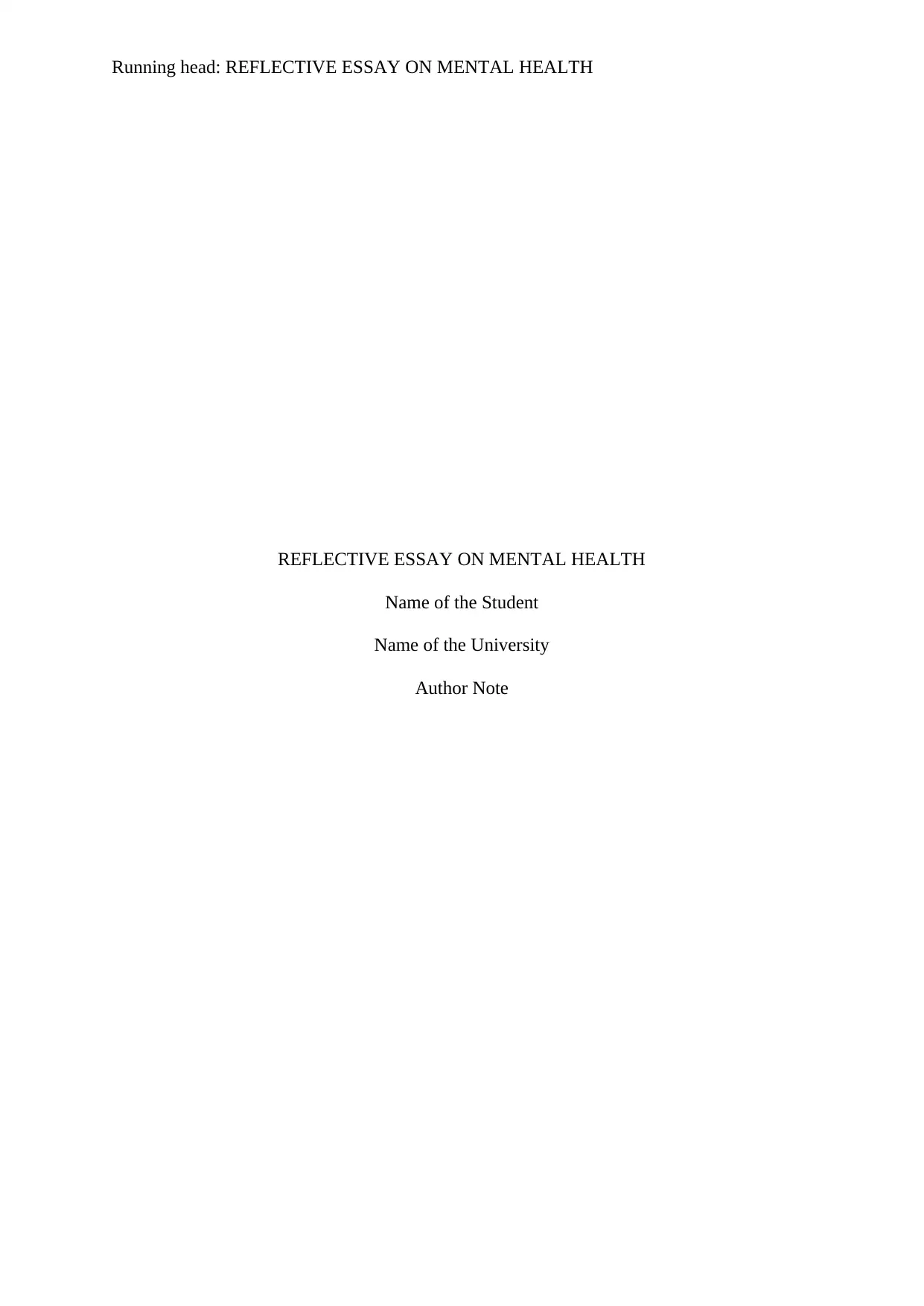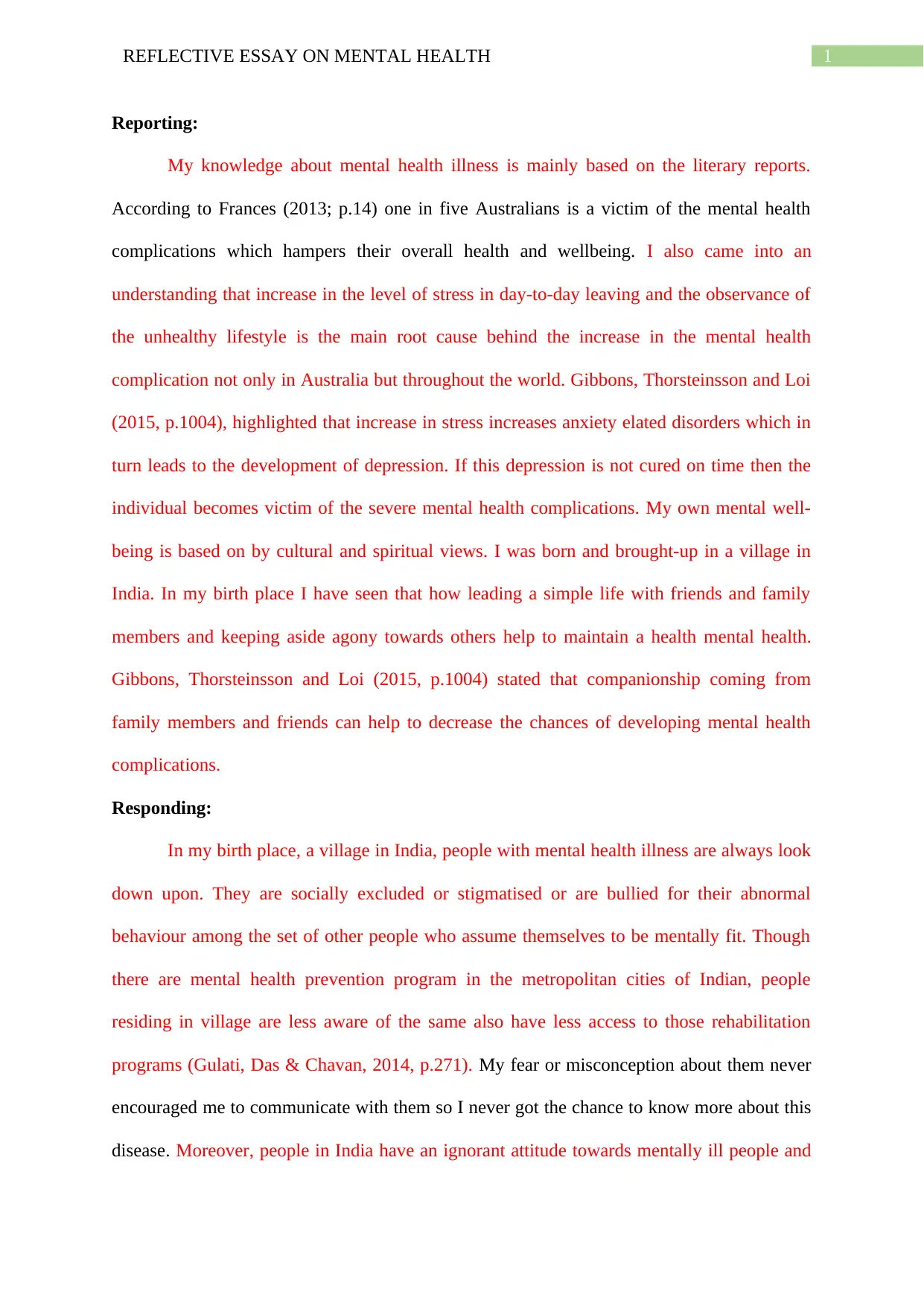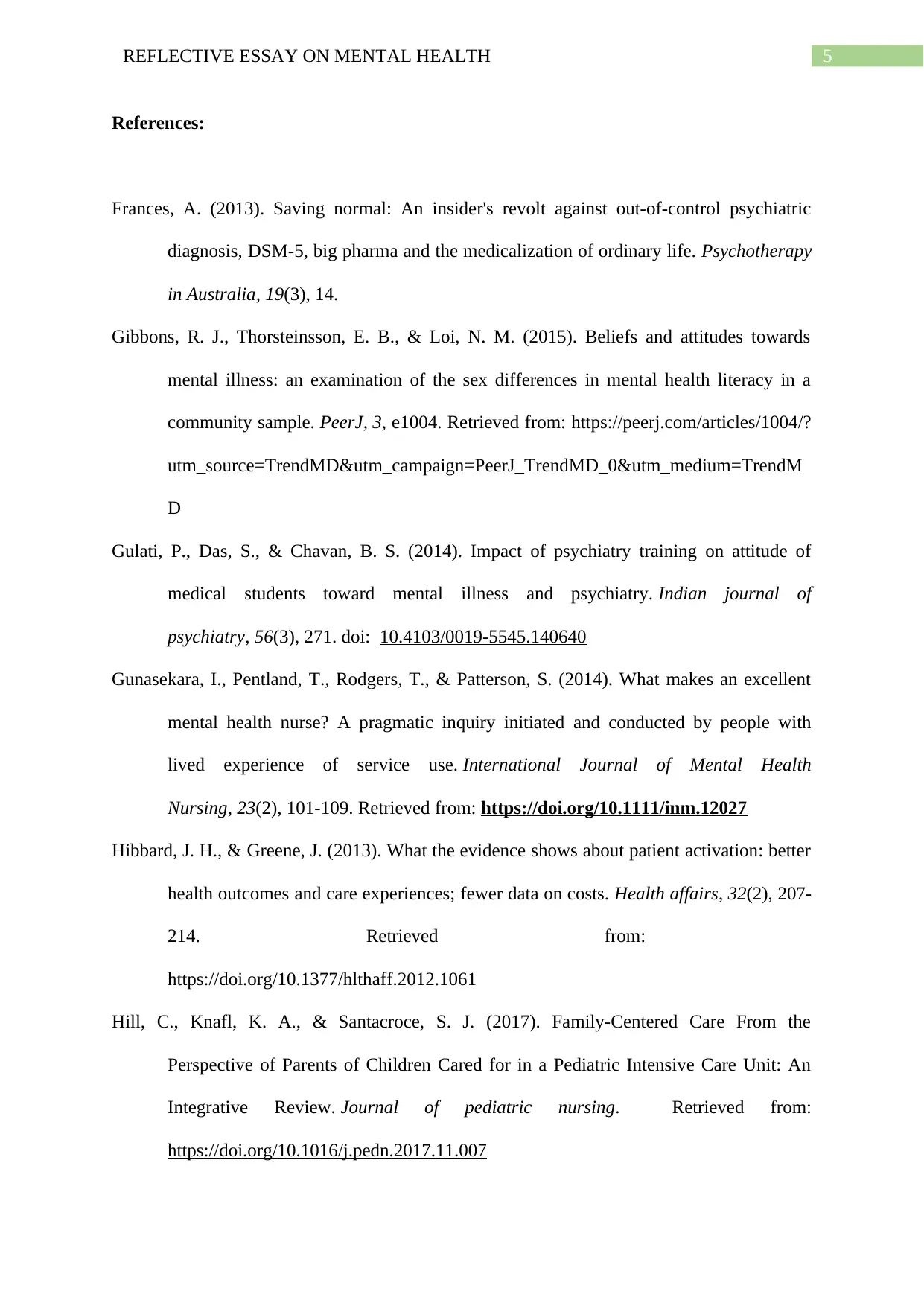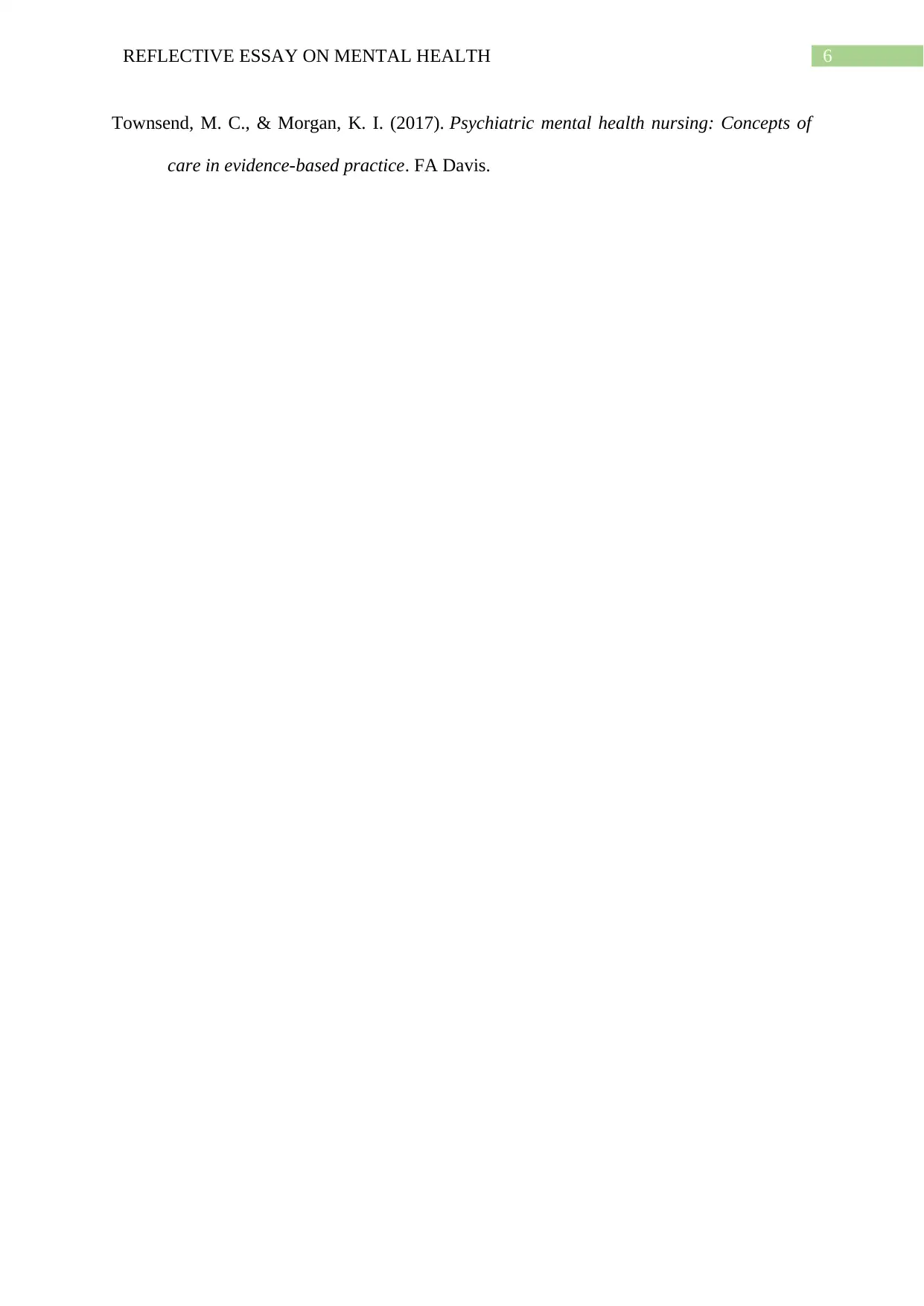Reflective Essay on Mental Health
VerifiedAdded on 2023/06/09
|7
|1671
|109
AI Summary
This reflective essay discusses the author's knowledge, response, and reasoning about mental health illness. It also highlights the importance of active listening and therapeutic relationships in mental health service delivery.
Contribute Materials
Your contribution can guide someone’s learning journey. Share your
documents today.

Running head: REFLECTIVE ESSAY ON MENTAL HEALTH
REFLECTIVE ESSAY ON MENTAL HEALTH
Name of the Student
Name of the University
Author Note
REFLECTIVE ESSAY ON MENTAL HEALTH
Name of the Student
Name of the University
Author Note
Secure Best Marks with AI Grader
Need help grading? Try our AI Grader for instant feedback on your assignments.

1REFLECTIVE ESSAY ON MENTAL HEALTH
Reporting:
My knowledge about mental health illness is mainly based on the literary reports.
According to Frances (2013; p.14) one in five Australians is a victim of the mental health
complications which hampers their overall health and wellbeing. I also came into an
understanding that increase in the level of stress in day-to-day leaving and the observance of
the unhealthy lifestyle is the main root cause behind the increase in the mental health
complication not only in Australia but throughout the world. Gibbons, Thorsteinsson and Loi
(2015, p.1004), highlighted that increase in stress increases anxiety elated disorders which in
turn leads to the development of depression. If this depression is not cured on time then the
individual becomes victim of the severe mental health complications. My own mental well-
being is based on by cultural and spiritual views. I was born and brought-up in a village in
India. In my birth place I have seen that how leading a simple life with friends and family
members and keeping aside agony towards others help to maintain a health mental health.
Gibbons, Thorsteinsson and Loi (2015, p.1004) stated that companionship coming from
family members and friends can help to decrease the chances of developing mental health
complications.
Responding:
In my birth place, a village in India, people with mental health illness are always look
down upon. They are socially excluded or stigmatised or are bullied for their abnormal
behaviour among the set of other people who assume themselves to be mentally fit. Though
there are mental health prevention program in the metropolitan cities of Indian, people
residing in village are less aware of the same also have less access to those rehabilitation
programs (Gulati, Das & Chavan, 2014, p.271). My fear or misconception about them never
encouraged me to communicate with them so I never got the chance to know more about this
disease. Moreover, people in India have an ignorant attitude towards mentally ill people and
Reporting:
My knowledge about mental health illness is mainly based on the literary reports.
According to Frances (2013; p.14) one in five Australians is a victim of the mental health
complications which hampers their overall health and wellbeing. I also came into an
understanding that increase in the level of stress in day-to-day leaving and the observance of
the unhealthy lifestyle is the main root cause behind the increase in the mental health
complication not only in Australia but throughout the world. Gibbons, Thorsteinsson and Loi
(2015, p.1004), highlighted that increase in stress increases anxiety elated disorders which in
turn leads to the development of depression. If this depression is not cured on time then the
individual becomes victim of the severe mental health complications. My own mental well-
being is based on by cultural and spiritual views. I was born and brought-up in a village in
India. In my birth place I have seen that how leading a simple life with friends and family
members and keeping aside agony towards others help to maintain a health mental health.
Gibbons, Thorsteinsson and Loi (2015, p.1004) stated that companionship coming from
family members and friends can help to decrease the chances of developing mental health
complications.
Responding:
In my birth place, a village in India, people with mental health illness are always look
down upon. They are socially excluded or stigmatised or are bullied for their abnormal
behaviour among the set of other people who assume themselves to be mentally fit. Though
there are mental health prevention program in the metropolitan cities of Indian, people
residing in village are less aware of the same also have less access to those rehabilitation
programs (Gulati, Das & Chavan, 2014, p.271). My fear or misconception about them never
encouraged me to communicate with them so I never got the chance to know more about this
disease. Moreover, people in India have an ignorant attitude towards mentally ill people and

2REFLECTIVE ESSAY ON MENTAL HEALTH
they consider them to be out of the main race of life. This kind of attitude also grew in my
mind since childhood. As a result of this, I never took initiative to think the underlying reason
behind their (mentally –ill people) unnatural behaviour. However, my enrolment in this
course in Australia changed my complete mind-set about the people with mental health
illness. I came into an understanding that the people with mental health complications have
equal right in leading a healthy and safe life among the other people in the community.
Proper counselling from the mental health nurse, taking proper mental health interventions
and support from the family members will help them to venture into healthy and normal
lifestyle.
Reasoning:
Apart from academic exposure, during my stay here in Australia, I watched and re-
watched a variety of movies based on mental health complication like, A Beautiful Mind,
which based on the eminent Nobel laureate John Nash. John a famous mathematician was a
patient of schizophrenia and he used to undergo series of delusions and hallucinations and the
same is replicated as unnatural behaviour. In association to this, my study helped me realize
each mental patient is different in their own way and should be handled accordingly. Every
individual with mental health must be given equal important along with provision for
autonomy, irrespective of the age, gender, race, ethnicity and class with proper respect
(Townsend & Morgan, 2017; p. 35).While my stay in Australia, my got an opportunity to get
a first-hand experience of watch an individual with mental health complications, my
landlord’s son. He was suffering from severe depression and was committing self-harm and
has attempted suicide. Interventions from the metal health professional and proper care
planning with the help of mental health assessment tool elucidated that my landlord’s son was
suffering from major depressive disorder. Person-centred care plan helped him to recover
gradually.
they consider them to be out of the main race of life. This kind of attitude also grew in my
mind since childhood. As a result of this, I never took initiative to think the underlying reason
behind their (mentally –ill people) unnatural behaviour. However, my enrolment in this
course in Australia changed my complete mind-set about the people with mental health
illness. I came into an understanding that the people with mental health complications have
equal right in leading a healthy and safe life among the other people in the community.
Proper counselling from the mental health nurse, taking proper mental health interventions
and support from the family members will help them to venture into healthy and normal
lifestyle.
Reasoning:
Apart from academic exposure, during my stay here in Australia, I watched and re-
watched a variety of movies based on mental health complication like, A Beautiful Mind,
which based on the eminent Nobel laureate John Nash. John a famous mathematician was a
patient of schizophrenia and he used to undergo series of delusions and hallucinations and the
same is replicated as unnatural behaviour. In association to this, my study helped me realize
each mental patient is different in their own way and should be handled accordingly. Every
individual with mental health must be given equal important along with provision for
autonomy, irrespective of the age, gender, race, ethnicity and class with proper respect
(Townsend & Morgan, 2017; p. 35).While my stay in Australia, my got an opportunity to get
a first-hand experience of watch an individual with mental health complications, my
landlord’s son. He was suffering from severe depression and was committing self-harm and
has attempted suicide. Interventions from the metal health professional and proper care
planning with the help of mental health assessment tool elucidated that my landlord’s son was
suffering from major depressive disorder. Person-centred care plan helped him to recover
gradually.

3REFLECTIVE ESSAY ON MENTAL HEALTH
Relating:
NSB023 tutorials, study materials and classes helped me to gain theoretical
knowledge about the underlying reason behind the development of mental health
complications and the role of the mental health nurses. I also learnt that there are different
types of serious mental illness apart from schizophrenia like dementia, major depressive
disorders, and anxiety disorders. At times mental disorder take a fatal of progressive
neurological complications and then they are termed as Parkinson's disease and Alzheimer
disease (Hibbard & Greene, 2013, p.207-2014). Moreover, the interactive sessions and the
videos which are shown during the class helped me to develop my understanding about how
to approach an individual with mental health complications. It enlightened me about the
concept of active listening and maintenance of eye contact. Active listening through direct
eye contact and responding to the queries of the client helped them to indulge in the care plan
and this improves therapy outcomes (Gunasekara, Pentland, Rodgers & Patterson, 2014; p.
101-109). This aligns with my existing knowledge of effective nursing communication and
interpersonal skills. I also believe that active listening also helps in the promotion of
therapeutic relationships with is another pillar of mental health service delivery. The
emotional response which I have experience while enrolled under this course is sympathy
towards the mental health patients. I realised that how their inability to express their feelings
clearly and out inability to gauge their feeling create a gape over care plan. I feel sad because,
he always do not listen to their concerns attentively.
Reconstructing:
The information and knowledge which I have gained from NSB023 can be used
effectively used in future when I indulge in the professional work of registered mental health
nurse. Moreover, development of therapeutic relationships and the concept of active
listening can be employed in other wings of the nursing professional like aged care geriatric
Relating:
NSB023 tutorials, study materials and classes helped me to gain theoretical
knowledge about the underlying reason behind the development of mental health
complications and the role of the mental health nurses. I also learnt that there are different
types of serious mental illness apart from schizophrenia like dementia, major depressive
disorders, and anxiety disorders. At times mental disorder take a fatal of progressive
neurological complications and then they are termed as Parkinson's disease and Alzheimer
disease (Hibbard & Greene, 2013, p.207-2014). Moreover, the interactive sessions and the
videos which are shown during the class helped me to develop my understanding about how
to approach an individual with mental health complications. It enlightened me about the
concept of active listening and maintenance of eye contact. Active listening through direct
eye contact and responding to the queries of the client helped them to indulge in the care plan
and this improves therapy outcomes (Gunasekara, Pentland, Rodgers & Patterson, 2014; p.
101-109). This aligns with my existing knowledge of effective nursing communication and
interpersonal skills. I also believe that active listening also helps in the promotion of
therapeutic relationships with is another pillar of mental health service delivery. The
emotional response which I have experience while enrolled under this course is sympathy
towards the mental health patients. I realised that how their inability to express their feelings
clearly and out inability to gauge their feeling create a gape over care plan. I feel sad because,
he always do not listen to their concerns attentively.
Reconstructing:
The information and knowledge which I have gained from NSB023 can be used
effectively used in future when I indulge in the professional work of registered mental health
nurse. Moreover, development of therapeutic relationships and the concept of active
listening can be employed in other wings of the nursing professional like aged care geriatric
Secure Best Marks with AI Grader
Need help grading? Try our AI Grader for instant feedback on your assignments.

4REFLECTIVE ESSAY ON MENTAL HEALTH
care. The service users of the aged-care are majorly victims of dementia along with the
physiological complications. This dementia arise from prolong depression along with age.
Lack of companionship and proper support from the family members force them into
depression and this further escalates into dementia with age. When I will encounter these type
situations I will make use of active listening and development of therapeutic relationship in
order to extract their actual mental concern and will draft the care plan accordingly. This will
increase their participation in the care process. This is main approach of person-centred care
plan. However, since I am not from Australian origin I might certain challenges in
understanding the spiritual and ethical values of the Australian people while drafting a care
plan for them. In order to overcome the situation, I will take help from the Australian nurse. I
also might face difficulty in handling paediatric population. However, development of
friendly relationship with them will help to overcome the problem (Hill, Knafl & Santacroce,
2017; p. 10-12). My never say die attitude and enthusiastic in seeking help from the
multidisciplinary care team will help me to succeed in my profession.
care. The service users of the aged-care are majorly victims of dementia along with the
physiological complications. This dementia arise from prolong depression along with age.
Lack of companionship and proper support from the family members force them into
depression and this further escalates into dementia with age. When I will encounter these type
situations I will make use of active listening and development of therapeutic relationship in
order to extract their actual mental concern and will draft the care plan accordingly. This will
increase their participation in the care process. This is main approach of person-centred care
plan. However, since I am not from Australian origin I might certain challenges in
understanding the spiritual and ethical values of the Australian people while drafting a care
plan for them. In order to overcome the situation, I will take help from the Australian nurse. I
also might face difficulty in handling paediatric population. However, development of
friendly relationship with them will help to overcome the problem (Hill, Knafl & Santacroce,
2017; p. 10-12). My never say die attitude and enthusiastic in seeking help from the
multidisciplinary care team will help me to succeed in my profession.

5REFLECTIVE ESSAY ON MENTAL HEALTH
References:
Frances, A. (2013). Saving normal: An insider's revolt against out-of-control psychiatric
diagnosis, DSM-5, big pharma and the medicalization of ordinary life. Psychotherapy
in Australia, 19(3), 14.
Gibbons, R. J., Thorsteinsson, E. B., & Loi, N. M. (2015). Beliefs and attitudes towards
mental illness: an examination of the sex differences in mental health literacy in a
community sample. PeerJ, 3, e1004. Retrieved from: https://peerj.com/articles/1004/?
utm_source=TrendMD&utm_campaign=PeerJ_TrendMD_0&utm_medium=TrendM
D
Gulati, P., Das, S., & Chavan, B. S. (2014). Impact of psychiatry training on attitude of
medical students toward mental illness and psychiatry. Indian journal of
psychiatry, 56(3), 271. doi: 10.4103/0019-5545.140640
Gunasekara, I., Pentland, T., Rodgers, T., & Patterson, S. (2014). What makes an excellent
mental health nurse? A pragmatic inquiry initiated and conducted by people with
lived experience of service use. International Journal of Mental Health
Nursing, 23(2), 101-109. Retrieved from: https://doi.org/10.1111/inm.12027
Hibbard, J. H., & Greene, J. (2013). What the evidence shows about patient activation: better
health outcomes and care experiences; fewer data on costs. Health affairs, 32(2), 207-
214. Retrieved from:
https://doi.org/10.1377/hlthaff.2012.1061
Hill, C., Knafl, K. A., & Santacroce, S. J. (2017). Family-Centered Care From the
Perspective of Parents of Children Cared for in a Pediatric Intensive Care Unit: An
Integrative Review. Journal of pediatric nursing. Retrieved from:
https://doi.org/10.1016/j.pedn.2017.11.007
References:
Frances, A. (2013). Saving normal: An insider's revolt against out-of-control psychiatric
diagnosis, DSM-5, big pharma and the medicalization of ordinary life. Psychotherapy
in Australia, 19(3), 14.
Gibbons, R. J., Thorsteinsson, E. B., & Loi, N. M. (2015). Beliefs and attitudes towards
mental illness: an examination of the sex differences in mental health literacy in a
community sample. PeerJ, 3, e1004. Retrieved from: https://peerj.com/articles/1004/?
utm_source=TrendMD&utm_campaign=PeerJ_TrendMD_0&utm_medium=TrendM
D
Gulati, P., Das, S., & Chavan, B. S. (2014). Impact of psychiatry training on attitude of
medical students toward mental illness and psychiatry. Indian journal of
psychiatry, 56(3), 271. doi: 10.4103/0019-5545.140640
Gunasekara, I., Pentland, T., Rodgers, T., & Patterson, S. (2014). What makes an excellent
mental health nurse? A pragmatic inquiry initiated and conducted by people with
lived experience of service use. International Journal of Mental Health
Nursing, 23(2), 101-109. Retrieved from: https://doi.org/10.1111/inm.12027
Hibbard, J. H., & Greene, J. (2013). What the evidence shows about patient activation: better
health outcomes and care experiences; fewer data on costs. Health affairs, 32(2), 207-
214. Retrieved from:
https://doi.org/10.1377/hlthaff.2012.1061
Hill, C., Knafl, K. A., & Santacroce, S. J. (2017). Family-Centered Care From the
Perspective of Parents of Children Cared for in a Pediatric Intensive Care Unit: An
Integrative Review. Journal of pediatric nursing. Retrieved from:
https://doi.org/10.1016/j.pedn.2017.11.007

6REFLECTIVE ESSAY ON MENTAL HEALTH
Townsend, M. C., & Morgan, K. I. (2017). Psychiatric mental health nursing: Concepts of
care in evidence-based practice. FA Davis.
Townsend, M. C., & Morgan, K. I. (2017). Psychiatric mental health nursing: Concepts of
care in evidence-based practice. FA Davis.
1 out of 7
Related Documents
Your All-in-One AI-Powered Toolkit for Academic Success.
+13062052269
info@desklib.com
Available 24*7 on WhatsApp / Email
![[object Object]](/_next/static/media/star-bottom.7253800d.svg)
Unlock your academic potential
© 2024 | Zucol Services PVT LTD | All rights reserved.



